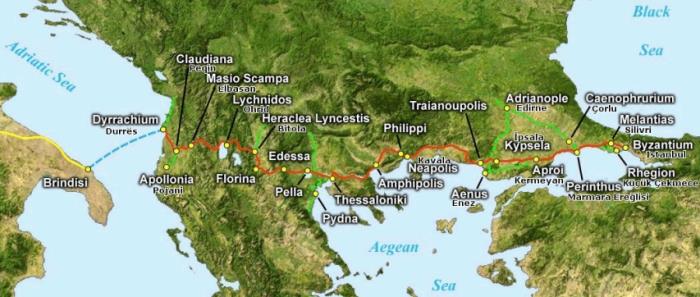Ancient Ephesus, situated on the most west point of Asia Minor (modern-day Selçuk, Turkey), was strategically positioned for trade and obviously when Ephesus was founded, this place was especially chosen. The city’s location facilitated economic interactions with both the Mediterranean, Greece, Egypt, Persian and inland regions. Here are some of the main trade routes and trade partners of Ephesus:

Via Egnatia
The Via Egnatia was a major Roman road that connected the Adriatic Sea to Byzantium (modern-day Istanbul). Ephesus, as a significant city in the Roman Empire being the capital of the Asia Minor state, was connected to this road network. The Via Egnatia facilitated trade and communication across the Balkans, connecting Ephesus to the wider Western Roman world.
Mediterranean and Aegean Sea Routes
Ephesus had a well-developed harbor that served as a gateway to maritime trade in the Mediterranean and Aegean Seas. Ships carrying goods and commodities such as wine, cotton, ceramics and many more, sailed to and from Ephesus, linking the city to other major ports such as Alexandria in Egypt, Athens in Greece, and Rome in Italy. The city’s harbor was strategically important for the exchange of goods and cultural influences. All these exchanges used to take place at the Agora of Ephesus.
Silk Road Connections
Ephesus was a key node in the overland Silk Road trade routes thanks to its harbor. While the Silk Road is often associated with the overland routes through Central Asia to the west and back, maritime routes also played a crucial role. Ephesus served as a port where goods from the East, including silk, spices, and precious metals, arrived by sea before being distributed to other parts of the Roman Empire.
The Royal Road
The Royal Road was an ancient trade route, which was settled by the Persian Empire, that connected Ephesus to other major cities in Anatolia, such as Sardis. It was a crucial route for land and caravan trade, facilitating the exchange of goods and ideas between different regions.
Trade with the Black Sea Region
Ephesus maintained trade connections with cities along the Black Sea coast. Goods such as grain, timber, and other commodities flowed through this route. The Black Sea was an important trade region, and Ephesus, with its access to the Aegean Sea, could engage in commerce with cities along the Black Sea shores such as Odessos, Harpis, Tyras and Callatis.
Trade with Constantinople or Byzantium
As the capital of the Byzantine Empire, Constantinople (Istanbul today) played a central role in trade, and Ephesus maintained a significant commercial relationship with the imperial city. The trade route between Ephesus and Constantinople facilitated the exchange of goods, including agricultural produce, manufactured goods, and luxury items. Later, when Ephesus or modern Selçuk town had its first railroad, the route was between Ephesus and Istanbul.
Agricultural Trade Routes
The farmlands around Ephesus were fertile, just like today. The Meander River Valley was known for its productive agricultural lands and plenty of water. Ephesus was the center of the trade of agricultural products, including cereals, olives, and wine, with other regions within the Roman Empire.
Inland Routes
Inland routes connected Ephesus to neighboring cities such as Smyrna, Miletos and Priene and regions. Caravanserais, or roadside inns, facilitated trade by providing rest stops and accommodations for merchants and their caravans. These routes allowed for the movement of goods overland, connecting Ephesus to the interior regions of Asia Minor. This trading route is still used today.
Trade with Cyprus, Rhodes and Other Islands
The proximity of Ephesus to the eastern Mediterranean islands, such as Cyprus and Rhodes, facilitated maritime trade. Ephesus served as a hub for the exchange of goods with these islands, including agricultural products, metals, and manufactured goods.
Regional Trade
Ephesus also engaged in trade with neighboring cities and regions within Asia Minor. The city’s proximity to other prominent centers, such as Cappadocia, Lydia, Pamphylia, and Lycia, fostered regional trade networks. These trade routes facilitated the exchange of goods and cultural influences, contributing to the vibrant commercial atmosphere of Ancient Ephesus.
These trade routes collectively contributed to the economic prosperity and cultural richness of ancient Ephesus. The city’s strategic location allowed it to serve as a vital link in the broader network of trade routes that crisscrossed the ancient Roman world.
Visit Ephesus with a local Ephesian Tour Guide
Ephesus has been the center of trade thanks to its unique location. Also, this location helped Ephesus to become the capital of Asia Minor state and brought an amazing wealth into the city. Contact me to learn more about Ephesus and to hire a professional tour guide for Ephesus Ancient city and surrounding attractions. See you soon, Hasan Gülday.